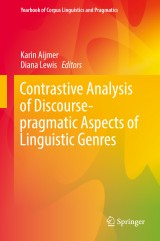Details

Contrastive Analysis of Discourse-pragmatic Aspects of Linguistic Genres
Yearbook of Corpus Linguistics and Pragmatics, Band 5
|
CHF 142.00 |
|
| Verlag: | Springer |
| Format: | |
| Veröffentl.: | 29.03.2017 |
| ISBN/EAN: | 9783319545561 |
| Sprache: | englisch |
Dieses eBook enthält ein Wasserzeichen.
Beschreibungen
This volume will give readers insight into how genres are characterised by the patterns of frequency and distribution of linguistic features across a number of European languages. The material presented in this book will also stimulate further corpus-based contrastive research including more languages, more genres and different types of corpora. This is the first special issue of the Yearbook of Corpus Linguistics and Pragmatics, a publication that addresses the interface between the two disciplines and offers a platform to scholars who combine both methodologies to present rigorous and interdisciplinary findings about language in real use. Corpus linguistics and Pragmatics have traditionally represented two paths of scientific thought, parallel but often mutually exclusive and excluding. Corpus Linguistics can offer a meticulous methodology based on mathematics and statistics, while Pragmatics is characterized by its effort in the interpretation of intended meaning in real language.
Introduction by Jesús Romero-Trillo.- Part I: SOCIETY, SOCIAL NETWORKS AND CORPUS PRAGMATICS.- Towards a cyberpragmatics of mobile instant messaging by Francisco Yus.- Connected parents: combining online and off-line parenthood in blogs and vlogs by Carmen Santamaría-García.- Healing and comfort on the net: Gender and emotions in domestic violent environments by Eva M. Mestre-Mestre.- “The more please [places] I see the more I think of home”: On gendered discourse of Irishness and migration experiences by Nancy E. Avila-Ledesma, & Carolina P. Amador-Moreno.- A cross-linguistic study of conceptual metaphors in financial discourse by María Muelas-Gil.- Part II: LINGUISTIC AND EDUCATIONAL IMPLICATIONS OF CORPUS PRAGMATICS.- Teaching pragmatics with corpus data: The development of a corpus-referred website for the instruction of routine formulas in Russian by Edie Furniss.- Beyond engaged listenership: Assessing Spanish undergraduates’ active participation in academic mentoring sessions in English as academic lingua franca by Fiona MacArthur.- Focusing on content or language?: comparing paired conversations in CLIL and EFL classrooms, using a corpus by Keiko Tsuchiya.- Writers’ uncertainty in a corpus of scientific biomedical articles with a diachronic perspective by Andrzej Zuczkowski, Ramona Bongelli, Ilaria Riccioni, Massimiliano Valotto, Roberto Burro.- Chinese University Students’ Development of Pragmatic Skills in L2 Italian: a Corpus-Based Study by Andrea Scibetta.- BOOK REVIEWS: Review of Bamford, J., Cavalieri, S. and Diani, G. (Eds). (2013) Variation and Change in Spoken and Written Discourse: Perspectives from Corpus Linguistics. Amsterdam: John Benjamins. (Claire Childs).- Review of Kruger, A., Wallmach, K. and Munday J. (2011) Corpus-Based Translation Studies: Research and Applications. London and New York: Bloomsbury. (Sofia Malamatidou).- Review of Hyland, K., Huat, C. M. and Handford, M. (2012). Corpus Applications in Applied Linguistics.London: Bloomsbury. (Karen Donnelly).
This volume will give readers insight into how genres are characterised by the patterns of frequency and distribution of linguistic features across a number of European languages. The material presented in this book will also stimulate further corpus-based contrastive research including more languages, more genres and different types of corpora. This is the first thematic volume of the Yearbook of Corpus Linguistics and Pragmatics, a publication that addresses the interface between the two disciplines and offers a platform to scholars who combine both methodologies to present rigorous and interdisciplinary findings about language in real use. Corpus linguistics and Pragmatics have traditionally represented two paths of scientific thought, parallel but often mutually exclusive and excluding. Corpus Linguistics can offer a meticulous methodology based on mathematics and statistics, while Pragmatics is characterized by its effort in the interpretation of intended meaning in real language.<p></p>
Offers insights on how corpus-based research can contribute to our knowledge of linguistic features and genres Articles present findings on several European languages Encourages further research in more languages, genres, and using different types of corpora
“The volume edited by Aijmer and Lewis is an interesting and original contribution to the areas of pragmatics, discourse and genre studies. It achieves good balance between theory and practice. The chapters adopt a usage-based approach, exploiting a range of corpus material. Languages involved in the comparisons with English are Czech, Dutch, French, Polish, Norwegian, Spanish and Swedish. The book will make a valuable contribution to courses on corpus linguistics, pragmatics, stylistics and genre, discourse studies and the English language.” (Anna Gladkova, University of Brighton, UK)<p></p>
Diese Produkte könnten Sie auch interessieren:

Language Policy and Modernity in Southeast Asia

von: Antonio L. Rappa, Lionel Wee Hock An

CHF 118.00















